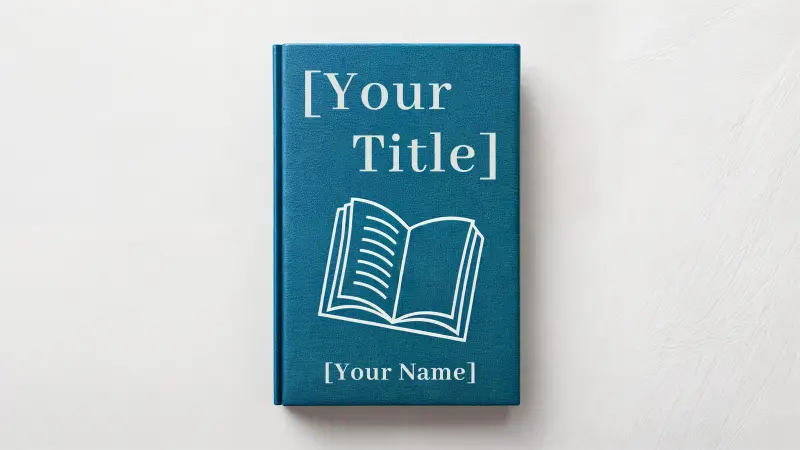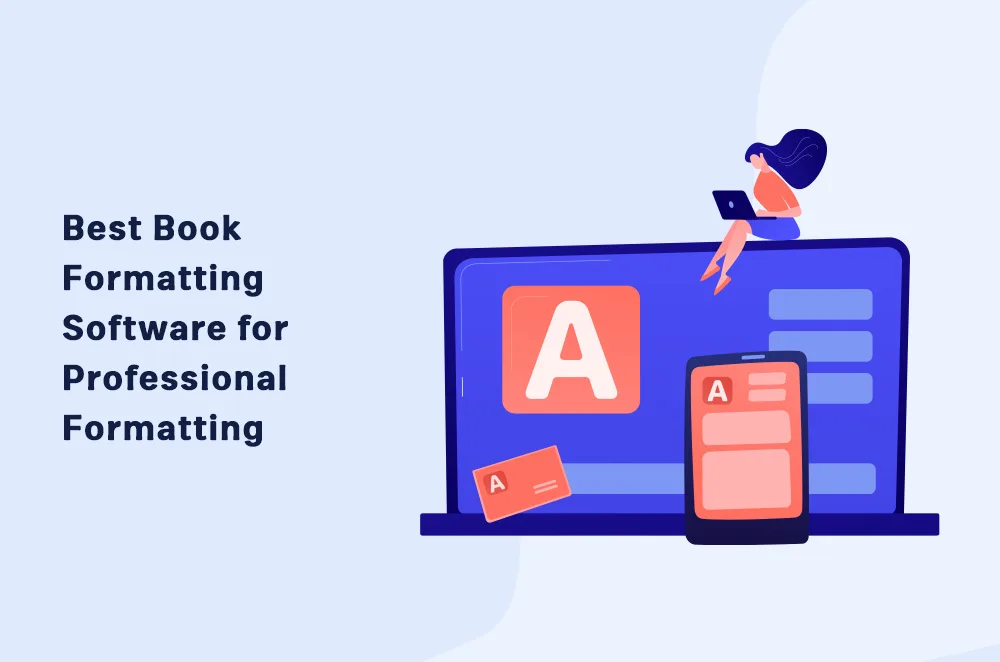Copyright isn’t just a legal checkbox—it’s your first line of defense as an author. Understanding what copyright does helps you protect your work from plagiarism, unauthorized use, and lost revenue opportunities.
This practical guide breaks down everything about copyrighting a book, including the exact steps to register and why doing so is a smart move for any serious author.
How to Copyright a Book: Step-by-Step Registration Process
If you’re ready to protect your book, the U.S. Copyright Office makes it simple. Here’s how to register your book copyright.
Step 1: Finish Your Manuscript
To qualify for copyright, your book must be complete and in a fixed format, such as typed in a Word document or exported as a PDF.
Things to remember when preparing the manuscript:
Copyright doesn’t protect ideas and outlines. Copyright only applies to complete content that you write down or otherwise record. Brainstorms, summaries, or concept notes don’t count.
Drafts don’t count. Early or partial drafts lack the coherence or structure needed for copyright protection. Ensure your manuscript is as close to the final version as possible before starting the registration process.
Your manuscript must be eligible for submission as an electronic copy, which you’ll upload when you register electronically through the U.S. Copyright Office.
If you’re pursuing traditional publishing, finishing the manuscript is the first step before sending it to agents or editors. Registering your copyright adds an extra layer of security before sharing your work with others.
Step 2: Go to the U.S. Copyright Office Website
The copyright registration process goes through copyright.gov, the website of the U.S. Copyright Office.
Create a new account on the Electronic Copyright Office (eCO) registration portal.
Use the “Register a Work” registration option to start a new electronic registration.
Pro tip: Save your login info. You’ll use this account to track your registration application and get your certificate.

Step 3: Fill Out the Registration Form
Once logged in to the Electronic Copyright Office (eCO), you must complete a form that collects key information about your book and you. Be careful and accurate to avoid delays or rejection.
You’ll be asked to provide the following:
Author name(s) and contact information: Include the full legal name of the author or authors, along with mailing addresses and email contact. If you’re registering on behalf of someone else, like a client or employer, you’ll also specify your relationship to the work.
Book title and year of completion: Add the title exactly as it appears on the manuscript. The “year of completion” refers to when the final draft was finished—not when you started or when it might be published.
Genre and type (fiction, nonfiction, poetry, etc.): Indicate the nature of your work. Is it a memoir, instructional guide, novel, or collection of poems? This helps the U.S. Copyright Office classify and file your electronic copy for review.
Whether the book has been published yet
If unpublished, you can complete the registration online.
If published, you must specify the publication date and where it occurred (such as through Amazon or a traditional publisher). Some cases may also require submitting a physical copy and your digital file.
Ensure the information you enter matches your manuscript and any contracts or publishing agreements. Mistakes here can slow down your registration and weaken your copyright protection.
Important note: The publishing status affects how you submit your manuscript and may influence which fee applies. You can find the fees in the “Pay the Filing Fee” section below.

Step 4: Upload a Digital Copy of Your Book
In this step, you must submit a copy of your book as part of the registration.
For unpublished works, uploading a digital file (PDF, DOCX, etc.) is enough.
If published, you may be required to send physical copies.
Step 5: Pay the Filing Fee
Expect to pay a direct deposit between $45 and $65 for most single-author book registrations.
$45 for one author and one work (not for hire), filed online
$65+ for more complex registrations (multiple authors, works made for hire, etc.)
Note: You can find a complete list of fee categories on the U.S. Copyright Fee Schedule.
Step 6: Wait for Confirmation
After submission, you’ll receive confirmation and can track your application status via your eCO dashboard.
Processing time is typically 3 to 8 months.
Once approved, you’ll receive a Certificate of Registration via email or mail (depending on the submission type).
Why Book Copyright Matters
You hold the copyright when you write your book in a fixed, tangible form. That means no one else can legally copy, distribute, or sell your work without your permission. You are considered the copyright owner at this point, but your rights are limited if you don’t take further steps.
Here’s why registering your copyright makes a difference:
It gives you legal leverage. Only registered copyrights allow you to file a copyright infringement lawsuit and claim statutory damages.
It protects your rights internationally. Through agreements like the Berne Convention, registration helps you assert your ownership in other countries.
It streamlines licensing and traditional publishing deals. Whether you’re negotiating with agents, translators, or audiobook producers, you gain credibility when you register your copyright.
Without registration, enforcing your rights is more difficult. You could still sue someone who steals your work, but you’d need to prove ownership, track damages, and likely spend more on legal fees, with less chance of recovering your losses.
Who Owns the Copyright to a Book?
Ownership determines who decides what happens to the book. Let’s go over several cases.
If You’re the Sole Author
You own the copyright when you complete the book in a fixed form. No additional agreements or steps are needed for sole authorship.
You have full control over reproduction, distribution, adaptation, and performance rights.
You can choose to license or sell your rights, but they remain yours unless you sign a contract.
As the copyright holder, you can register your work at any point to further strengthen your protection.
If You Co-Author a Book
If two or more people contribute to the book without a written agreement specifying otherwise, all contributors own copyright.
Each author can use or license the book but must share profits.
Legal disputes can arise if one party acts without the other’s consent—written agreements are highly recommended.
Be clear in defining copyright ownership through contracts to prevent future misunderstandings.
If You’re Working Under a Contract
In a work-for-hire situation, like ghostwriting, freelancing, or employee-based writing, the person or company that commissioned the work owns the copyright.
This applies only when clearly stated in a contract.
Without a written work-for-hire agreement, the copyright owner is the person who wrote the content, not the client.
What Copyright Doesn’t Cover
Copyright is powerful, but it has limits. Understanding what’s not protected can save you from false assumptions and help you use other tools, like trademarks or contracts, when needed.
Copyright Protects the Expression, Not the Idea
You own the copyright to how you express an idea, not the idea itself.
Two people can write books on the same topic without infringing on each other’s copyrights.
The copyright protects the exact words, structure, and unique content, not general concepts. Copyright protection applies to how ideas are written, not the concepts themselves.
What’s Not Protected by Copyright
Some parts of your book fall outside the scope of copyright law. These include:
Book titles — You can’t copyright a title. Consider trademarking it if it’s part of a brand or series.
Character names — Unless they’re extremely distinctive and widely recognized, names alone aren’t protected. Harry Potter is an example of a protected name.
Themes and plots — Common tropes like “the chosen one” or “a quest for revenge” are not copyrightable.
What You Need Instead
If you’re trying to protect branding elements or prevent others from using your book’s identity, use the following:
Trademarks can protect book series names, logos, or taglines.
Contracts like NDAs or licensing agreements can protect against unauthorized use by collaborators or vendors.
Common Myths About Copyrighting a Book
There’s a lot of misinformation about how copyright works. These myths often lead authors to overcomplicate the process or skip steps. Let’s clear up the most common misconceptions.
Myth: I Need to Register My Copyright Before Publishing
Reality: Copyright is automatic as soon as your book is written in a fixed format. You don’t need to register it before self-publishing, but registration strengthens your legal rights if someone infringes on your work later. That said, registering your electronic copy before licensing or publishing gives you stronger legal standing.
Myth: Mailing Myself a Copy is Enough (“Poor Man’s Copyright”)
Reality: This outdated idea has no legal standing. Sending yourself a sealed envelope with your manuscript won’t help in court. The only way to officially document ownership is to start registration through the U.S. Copyright Office.
Myth: Copyright Laws Are the Same Everywhere
Reality: While many countries follow the Berne Convention, intellectual property laws vary by region. Registering in the U.S. won’t always protect you abroad unless you file in those jurisdictions or use international treaties to extend your copyright protection.
FAQs
Here are the most frequently asked questions about how to copyright a book.
Do I need to copyright short online literary works?
Yes, short online literary works are automatically protected by copyright once created, but registering them offers stronger legal standing in infringement cases.
Should I use an intellectual property attorney to copyright my book?
While not required, consulting an intellectual property attorney can help clarify legal terms, ensure proper registration electronically, and protect your rights—especially if you plan to license or publish the work.
Can a publishing company copyright my book for me?
Yes, publishing companies often handle copyright registration as part of their publishing process. However, you should verify whether the copyright is being registered in your name or theirs.
What is paper registration and is it better than online registration?
Paper registration refers to submitting a printed copyright form by mail, which some people prefer for record-keeping. However, online registration is typically faster, cheaper, and more efficient.
What is Form TX?
Form TX is the official registration form the U.S. Copyright Office uses to register published or unpublished non-dramatic literary works, such as books, poems, articles, and online written content.
How do I copyright sound recordings?
You can copyright a sound recording by registering it with the U.S. Copyright Office using Form SR. This involves submitting a copyright application, a copy of the recording, and the applicable fee.



